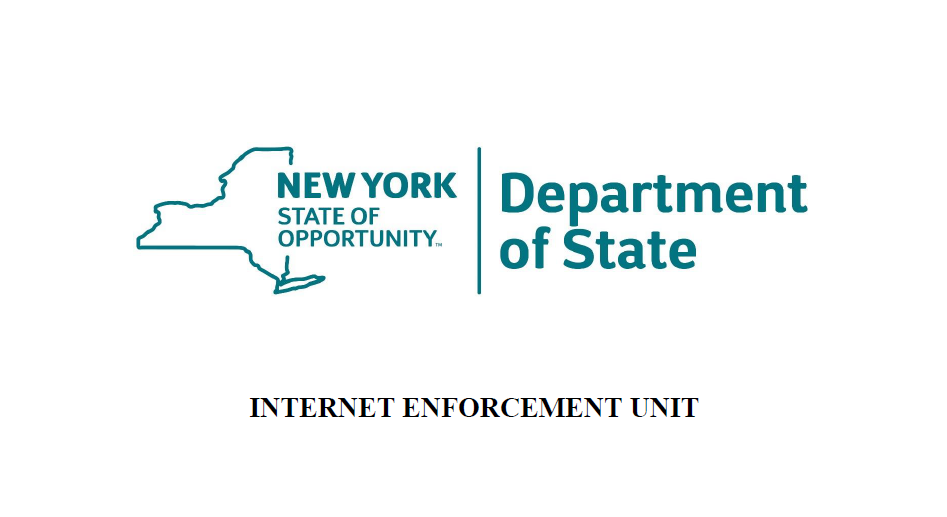Four Areas of Focus
The Division of Licensing Services has created a new enforcement initiative branded the “Internet Enforcement Unit” tasked with visiting real estate brokerage websites to detect violations and commence administrative proceedings against licensees. These investigations are low-hanging fruit that require minimal effort from the Department of State, yet result in easily prosecuted complaints.
The Internet Enforcement Unit has identified four areas of focus:
1. Fair Housing Disclosures
2. Standard Operating Procedures
3. Misidentification of License Types
4. Use of Unlicensed Aliases
Administrative Orders and Consent Orders Start To Roll In
The Internet Enforcement Unit is already achieving tangible results for the Department of State, with numerous administrative orders and consent orders already being entered. Examples include a $500.00 fine for misidentifying license types; a $1,000.00 fine for misidentifying license types; a $4,000.00 fine for misidentifying license types and failing to post the fair housing notice; a $2,000.00 fine for misidentifying license types and failing to post standard operating procedures; and a $2,000.00 fine for failing to post standard operating procedures and the fair housing notice.
What exactly are the requirements of these four areas of focus?
Fair Housing Disclosure
Pursuant to 19 NYCRR §175.29 “[a]ll websites created and maintained by real estate brokers, associate real estate brokers, real estate salespersons and any real estate team… shall prominently and conspicuously display on the homepage of such website a link to the Department’s notice as required by paragraph (a) of this section.”
A copy of the required notice is available on the Division of Licensing Service’s website.
It is important to note that the posting requirement is not limited to the brokerage’s homepage. Any website created or maintained by an associate broker, salesperson, or real estate team is also required to post the notice on their homepage. Brokers are reminded of their duty to supervise their licensees.
Standard Operating Procedures
A new requirement for 2022, all websites and mobile apps maintained by real estate brokers, associate real estate brokers, real estate salespersons, and real estate teams are required by RPL §442-h(4) to post date-stamped, signed, and notarized standard operating procedures addressing, at the minimum: (i) whether prospective clients shall show identification; (ii) whether an exclusive broker agreement is required; and (iii) whether pre-approval for a mortgage loan is required.
Misidentification of License Types
19 NYCRR §175.25(c) regulates the content of real estate brokerage advertisements. More specifically, §175.25(c)(4) requires advertisements to “correctly and accurately state the type of license held by the real estate broker, associate real estate broker or real estate salesperson named in the advertisements.”
While the regulation permits licensees to abbreviate the type of license held, the abbreviation cannot be misleading. The Division of Licensing Services has specifically identified a number of colloquial titles used by licensees which are explicitly prohibited, including “sales associate”, “licensed sales agent”, and “broker”.
Regulations do allow use of additional titles or designations, such as Realtor. However, they cannot appear on their own without the correct license type.
Unlicensed Aliases
19 NYCRR §175.25(c)(3) requires all advertisements — including websites — to display the name of the real estate broker, real estate associate broker, and real estate salesperson as licensed with the Department of State. While nicknames are permitted, the full licensed name must also appear conspicuously.
For example, a real estate salesperson licensed as “Jonathan Doe” may not advertise their name as “John Doe”, but may advertise their name as “Jonathan ‘John’ Doe”.
Other Areas Ripe for Internet Enforcement?
The four areas targeted by the Internet Enforcement Unit is not the end of the road. Other easily enforced violations include: (i) websites maintained by salespersons failing to link-back to their broker’s website; (ii) inaccurate property descriptions; (iii) emails missing required advertising content; (iv) web advertisements missing the disclosure “this advertisements does not suggest that the broker has a listing in this property or properties or that any property is currently available”; and (v) unpermitted team names.
Brokers are well-served to review their website, and the websites of their supervised licensees, to fend off the inevitable visit from the Internet Enforcement Unit.

